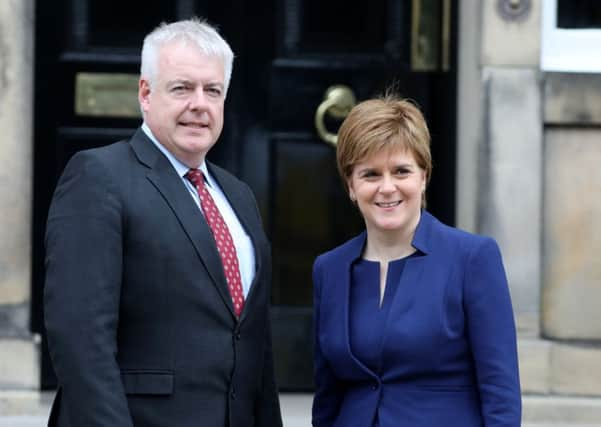Scottish and Welsh governments publish Brexit bill amendments


The Scottish and Welsh Government’s published 38 amendments they believe are required to stop Westminster taking control over areas of EU law they believe should be devolved to Edinburgh and Cardiff.
The Scottish Government also published a list of 111 powers, including areas such as agriculture, the environment, fisheries, forestry, research and justice co-operation, which would go to Westminster if the EU Withdrawal Bill remains in its current form.
Advertisement
Hide AdAdvertisement
Hide AdThe Scottish Government has repeatedly argued the Brexit Bill will see a Westminster “power grab” that would undermine the principles of devolution. The UK Government has countered by saying that once it has been decided which areas are best dealt with by a UK framework Scotland would benefit from a powers “bonanza”.
In a letter to Prime Minister Theresa May, Ms Sturgeon and Mr Jones warned: “The current Bill will need to be substantially amended for us to be able to recommend to our respective legislatures that they give their consent to it.
“Our Governments have therefore prepared a set of amendments which, if made, would make the Bill one which we could consider recommending to the Scottish Parliament and the National Assembly for Wales.”
They added: “We hope that they will be received in the way they are intended: as a constructive contribution by the devolved administrations, which would enable progress to be made among the governments in a way which respects the hard-won devolution settlements of the UK.”
Scotland’s Brexit minister Michael Russell published the 111 powers alongside a letter to Holyrood’s Finance and Constitution Committee. The list included environmental regulations and genetically modified crops as well as bureaucratic items like fertiliser regulation and food labelling.
The list was originally drawn up by the UK Government and sent to the Scottish Government.
Mr Russell said: “The list represents an initial assessment by the UK Government of where it believes that EU competences intersect with devolution and which therefore would be affected by the restrictions in the Bill.
“We were taken aback by the size of the list that was presented to us, but it shows the scale of what is at stake.
Advertisement
Hide AdAdvertisement
Hide Ad“They represent control over agriculture, fisheries, environmental regulation, relations between Scotland’s independent legal system and our European counterparts, State Aid and many more.
“It is perfectly possible for UK-wide frameworks to be agreed, but they must not be imposed by the UK Government with no respect for the founding principles of the devolution settlement.”
Mr Russell said the Scottish Government was willing to co-operate with the UK Government but must not mean allowing Westminster to “drive a coach and horses through the devolution settlement”.
“At present that is what the EU (Withdrawal) Bill does. The UK Government will take control of all policy areas exercised at EU level, whether they are devolved or not,” he said. “That is why the First Ministers of Scotland and Wales have described this bill as a naked power grab.
The 38 amendments have been designed to ensure devolved policy areas come back to the Scottish Parliament and National Assembly of Wales on EU withdrawal. They also stop UK ministers unilaterally changing the Scotland Act, which established devolution, and the Government of Wales Act. They require the agreement of the Scottish Government on the changes that are required to EU law in devolved areas after Brexit. They also ensure restrictions are not placed on devolved ministers compared with UK Government ministers.
